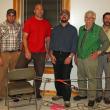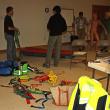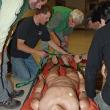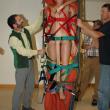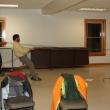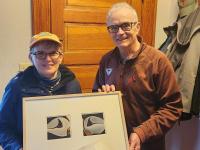Camden First Aid's technical rescue team rocks
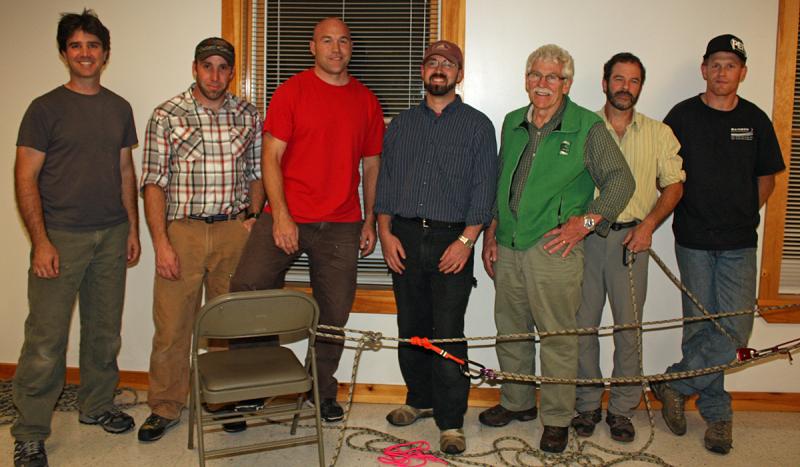 Members of Camden First Aid Association's technical rescue team at training Oct. 4, including Kevin Martin, Alan Rees, Wade Ward, Matt Silverio, Bill Bentley, Jeff Boston and John Weaver. (Photo by Holly S. Edwards)
Members of Camden First Aid Association's technical rescue team at training Oct. 4, including Kevin Martin, Alan Rees, Wade Ward, Matt Silverio, Bill Bentley, Jeff Boston and John Weaver. (Photo by Holly S. Edwards)
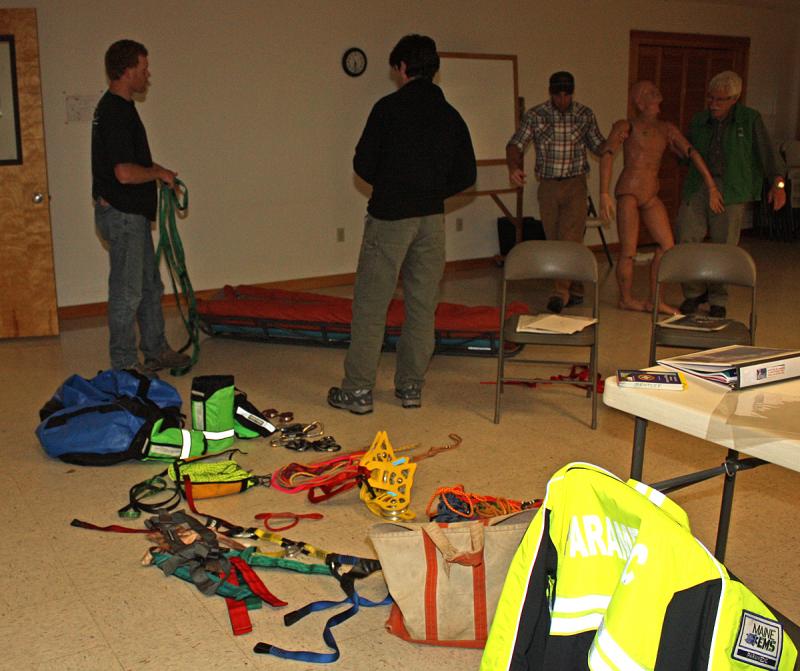 A mannikin is brought over to practice lashing, using straps and a litter. (Photo by Holly S. Edwards)
A mannikin is brought over to practice lashing, using straps and a litter. (Photo by Holly S. Edwards)
 Using a diagram, CFAA technical rescue team members practice lashing a patient into a litter for safe transport off a mountain. (Photo by Holly S. Edwards)
Using a diagram, CFAA technical rescue team members practice lashing a patient into a litter for safe transport off a mountain. (Photo by Holly S. Edwards)
 Another view of litter packagin training at Camden First Aid Association Oct. 4. (Photo by Holly S. Edwards)
Another view of litter packagin training at Camden First Aid Association Oct. 4. (Photo by Holly S. Edwards)
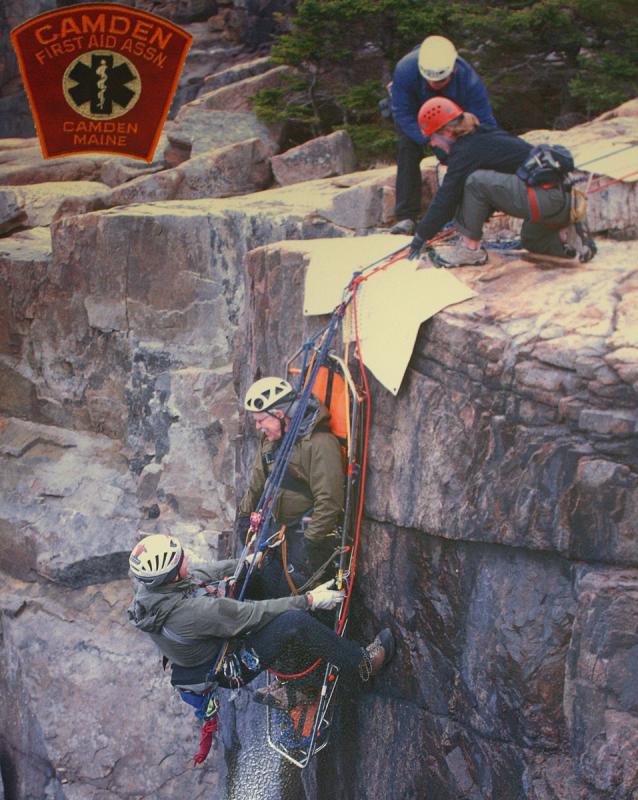 When packaged correctly, a patient can be lowered vertically down a mountain, like instructor Bill Bentley demonstrates in this training photo. (Photo by Holly S. Edwards)
When packaged correctly, a patient can be lowered vertically down a mountain, like instructor Bill Bentley demonstrates in this training photo. (Photo by Holly S. Edwards)
 Unloaded, the litter currently in use at Camden First Aid Association weighs 45 pounds. (Photo by Holly S. Edwards)
Unloaded, the litter currently in use at Camden First Aid Association weighs 45 pounds. (Photo by Holly S. Edwards)
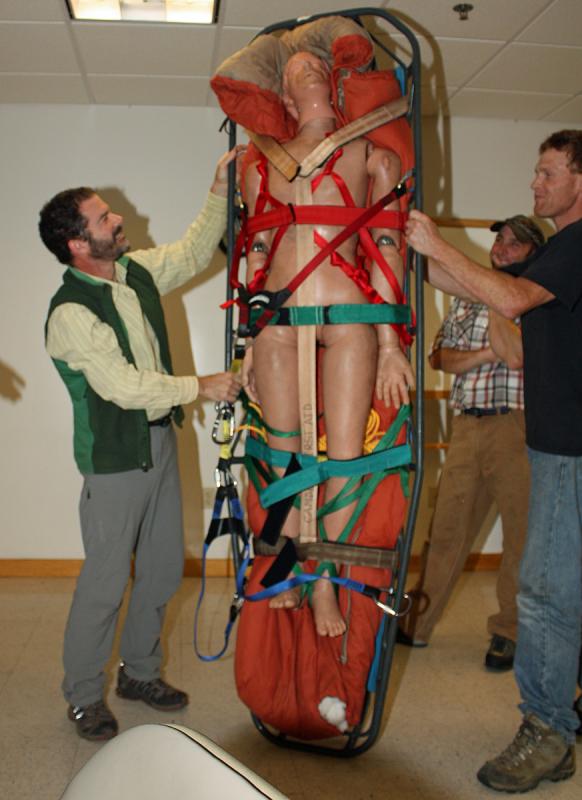 Properly packaged, the patient does not move within the litter at any angle. (Photo by Holly S. Edwards)
Properly packaged, the patient does not move within the litter at any angle. (Photo by Holly S. Edwards)
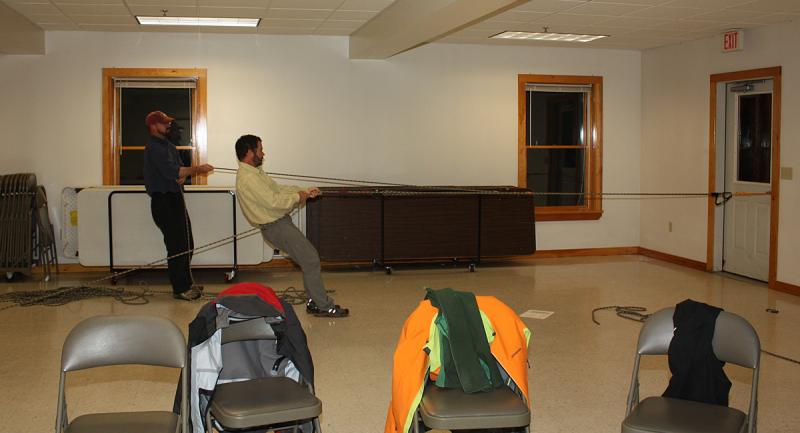 Also on the agenda for training Oct. 4: pulley set ups. (Photo by Holly S. Edwards)
Also on the agenda for training Oct. 4: pulley set ups. (Photo by Holly S. Edwards)
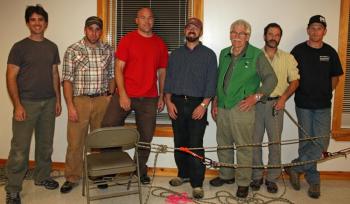 Members of Camden First Aid Association's technical rescue team at training Oct. 4, including Kevin Martin, Alan Rees, Wade Ward, Matt Silverio, Bill Bentley, Jeff Boston and John Weaver. (Photo by Holly S. Edwards)
Members of Camden First Aid Association's technical rescue team at training Oct. 4, including Kevin Martin, Alan Rees, Wade Ward, Matt Silverio, Bill Bentley, Jeff Boston and John Weaver. (Photo by Holly S. Edwards)
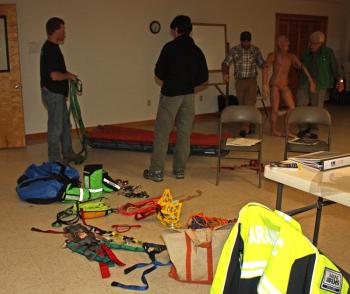 A mannikin is brought over to practice lashing, using straps and a litter. (Photo by Holly S. Edwards)
A mannikin is brought over to practice lashing, using straps and a litter. (Photo by Holly S. Edwards)
 Using a diagram, CFAA technical rescue team members practice lashing a patient into a litter for safe transport off a mountain. (Photo by Holly S. Edwards)
Using a diagram, CFAA technical rescue team members practice lashing a patient into a litter for safe transport off a mountain. (Photo by Holly S. Edwards)
 Another view of litter packagin training at Camden First Aid Association Oct. 4. (Photo by Holly S. Edwards)
Another view of litter packagin training at Camden First Aid Association Oct. 4. (Photo by Holly S. Edwards)
 When packaged correctly, a patient can be lowered vertically down a mountain, like instructor Bill Bentley demonstrates in this training photo. (Photo by Holly S. Edwards)
When packaged correctly, a patient can be lowered vertically down a mountain, like instructor Bill Bentley demonstrates in this training photo. (Photo by Holly S. Edwards)
 Unloaded, the litter currently in use at Camden First Aid Association weighs 45 pounds. (Photo by Holly S. Edwards)
Unloaded, the litter currently in use at Camden First Aid Association weighs 45 pounds. (Photo by Holly S. Edwards)
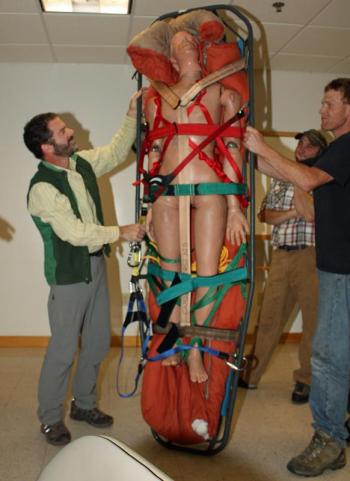 Properly packaged, the patient does not move within the litter at any angle. (Photo by Holly S. Edwards)
Properly packaged, the patient does not move within the litter at any angle. (Photo by Holly S. Edwards)
 Also on the agenda for training Oct. 4: pulley set ups. (Photo by Holly S. Edwards)
Also on the agenda for training Oct. 4: pulley set ups. (Photo by Holly S. Edwards)
CAMDEN — In its first year of being officially organized and recognized, Camden First Aid Association's technical rescue team has completed seven rescues.
"Climbing has literally exploded in the Camden area," said Bill Bentley, a highly regarded climber, climbing instructor and leader of CFAA's technical rescue team. Bentley also works part-time with CFAA as an ambulance driver and paramedic, a job he's been doing for more than 20 years, many of them as a volunteer.
Three of the team's seven calls involved injured hikers, who had to be carried off trails in litters.
"A couple of 'climbers,'" said Bentley, while raising his hands and wiggling his index fingers to indicate quote marks, "went up without equipment and climbed to a point where they couldn't go up or down."
The sixth rescue was of a woman who was allegedly pushed off Maiden's Cliff by her spouse and the seventh, and most recent, involved 28-year-old Maria Millard of Belfast. Millard failed to secure her rope and she fell 60 feet off Barrett's Cove Cliff Oct. 2.
Two days after carefully extracting Millard off the rocks where she landed, working with more than a dozen volunteers to carry her on a litter down the trail and transferring her to an awaiting ambulance, half of Bentley's team had reassembled for an evening of training Oct. 4.
CFAA's technical rescue team totals a dozen volunteer climbers at any one time. The group, mostly friends who climb together more than often than not, has been called on informally over the past two years to help with mountain rescues.
"We started doing it seriously a year ago," said Bentley. "Before that, we did it informally."
Since Millard's rescue was fresh in everyone's minds and four of the six in class had participated, a debriefing of the incident's cause and subsequent rescue was the first order of business.
After each member took a turn talking about what they did and saw from their perspective, the consensus was that nobody would have changed anything about the rescue.
"It just went really smooth," said team member John Weaver. "The training we've been going through really helped me stop, listen and take direction instead of just charging in to make things happen."
Knowing whom to listen to, understanding the steps necessary to help a victim and being ready to put into play the procedures practiced before a real emergency was acknowledged as key to Tuesday's smooth operation.
Following the discussion, everybody got the opportunity to practice the lashing procedure that kept Millard securely packaged in the litter. It's a procedure that is used in all technical rescue operations, and allows a patient to be carried flat, turned sideways or upside down and even lowered vertically without a person slipping out of the basket.
"In everything we do, we have to improvise," said Bentley, showing the group modifications to the lashing procedure, such as when a leg injury would prevent bearing weight on that leg.
The group also practiced various pulley setups, learning that certain setups would make it possible to lift a patient with fewer people pulling.
"We can bank on getting four team members to show up whether it’s a call or a meeting," said Bentley. "Being totally volunteer, that's as good as we'll get. If at least two people show up for a call we can get it done, but ideally we like to have four people."
CFAA's technical rescue team currently has the equipment it needs, some of which has been donated by Bentley and another team member. Bentley said Sterling Rope in Biddeford has been generous in donating rope, while CFAA purchased $2,000 worth of equipment, about 12 years ago.
"A lightweight litter is the most needed piece of equipment right now," said Bentley.
The team's current litter, used to carry Millard and everyone else needing rescue off local trails and mountains, weighs 45 pounds.
A titanium model weighs just 15 pounds, but can also be broken down to be carried like a backpack, or divided between two climbers who each carry half in their backpack. The cost of such a litter, said Bentley, is $1,400-$1,600.
With so many mountains, crevices, rocks and icicles to climb in the Midcoast, and a growing interest to explore and conquer them, it's no small comfort knowing there is a dedicated group of fellow climbers trained and ready to swing into action when trouble calls.
Editorial Director Holly S. Edwards can be reached by email at hollyedwards@penbaypilot.com or by calling 207-706-6655.
Event Date
Address
123 John Street
Camden, ME 04843
United States









